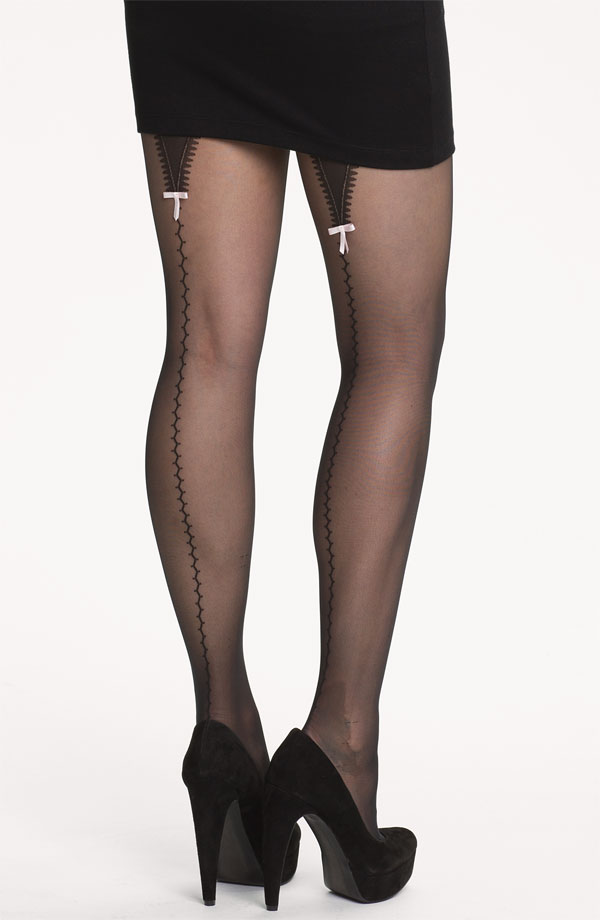A little over five years ago, Alison and Doug Kirk held their 9-year-old daughter's hand as she lay on a futon in their Nashville living room, told her they loved her, and watched her take her last breath.
The Kirks had known for a long time that their little girl, Caroline, would die. In her last weeks, she was under hospice care, lived off an oxygen machine, was fed through a tube, and spoke only in small murmurs. It was the normal course for a child born with Niemann-Pick, a terminal disease that gradually leads to the breakdown of the nervous system, brain and lungs.
What happened after Caroline's death was anything but typical.
Alison and Doug carried Caroline upstairs to the bathtub, where they washed her skin and hair, dried her limp, 45-pound body with a towel and placed her head on a pillow on the bed in her old room. Alison slipped a white communion dress on Caroline, turned up the air-conditioning and put ice packs by her daughter?s sides. She put pink lipstick on the child's paling lips, and covered up Caroline's toes and fingers, which were turning blue at the nails, with the family quilt.
Caroline stayed in her bedroom for 36 hours for her final goodbyes. There was no traditional funeral home service, and no coroner or medical examiner was on hand. Caroline's death was largely a home affair, with a short cemetery burial that followed.
"We had taken care of Caroline her whole life," recalls Alison, whose other daughter, Kate, has the same disease and will also have a home funeral. "Why would we give her to someone else once she died?"
Each year, 2.5 million Americans die. For the majority, about 70 percent, deaths happen in a hospital, nursing home or long-term care facility. What happens afterwards is nearly always the same, with few exceptions for religious traditions: A doctor or nurse will sign a death certificate and the body will be whisked to the funeral home, where it's washed, embalmed, dressed, and prepared for a viewing and burial. A family usually sees the dead only a few times: when they die, if there's an open-casket viewing and in the rare case when a casket is opened during burial.
But a small and growing group of Americans are returning to a more hands-on, no-frills experience of death. In the world of "do it yourself" funerals, freezer packs are used in lieu of embalming, unvarnished wooden boxes replace ornate caskets, viewings are in living rooms and, in some cases, burials happen in backyards.
Nobody keeps track of the number of home funerals and advocacy groups, but home funeral organizations have won battles in recent years in states such as Minnesota and Utah that have attempted to ban the practice. Most states have nearly eliminated any requirements that professionals play a role in funerals. It's now legal in all but eight states to care for one's own after death. And the growth of community-based, nonprofit home funeral groups and burial grounds that are friendly to the cause point to an increasing demand.
The reasons vary from the economic to the psychological and cultural. The average funeral costs $6,560, while a home funeral can cost close to nothing. In a society where seeing death and speaking of it is often taboo, home funeral advocates are challenging the notion that traditional funerals are anything but a natural end to life. Instead, they assert, death and mourning should be seen, smelled, touched and experienced.
"There are people who get it and think it's a great idea. And there are people who have been so indoctrinated to think a different way, a less hands-on way, that they can't imagine anything else," says Elizabeth Knox, the founder of Crossings, a Maryland-based home funeral resource organization and the vice president of the National Home Funeral Alliance. Knox travels across the nation to run trainings on do-it-yourself funerals and her book on her daughter's home funeral is what inspired the Kirks to do their own. Her group is one of several that have seen interest grow in recent years. They include Final Passages (California), Natural Transitions (Colorado) and Undertaken with Love (Texas). There are 61 organizations that are members of the NHFA, many of which are run by just one person.
"A lot of people don't want to do anything with touching dead bodies," says Knox. "They consider it creepy. But it can actually be the first step to healing and acceptance of death. Slowing down the process allows all involved to absorb the loss at their own pace. It's an organic emotional and spiritual healing not available from limited calling hours at a remote location."
*** 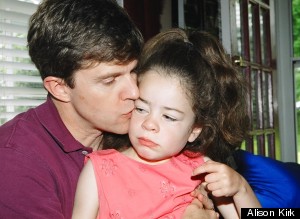
Caroline's father, Doug Kirk, and her when she was five. It was four years before her death.
Caroline died at noon on a Tuesday. Through Thursday morning, her body stayed in her childhood home, surrounded by old dolls, stuffed animals and her favorite books. Friends and family came in and out to say goodbye. Some would get on the bed beside her body, stroking her face and hair. Others would sit across from her in a rocking chair.
"In the morning, I spent time with Caroline. At night, I spent time with Caroline. I would tell her goodnight. It was very calming to sit next to her. I touched her. I kissed her. And I felt like this is where she was supposed to be," says Alison. "I told her things that were happening. I said there had been suffering in the last few days, but it was a relief that she was not suffering anymore."
A few dozen visitors came to the house throughout Wednesday. There was a guestbook in the downstairs hallway, and people would gather to chat on the porch. "Caroline is in her room, and if you want to say goodbye to her, you can do that," Alison would tell each guest. Most went upstairs for private visits in her bedroom. At least one couple decided not to visit her there.
In Tennessee, where the Kirks live, the laws on home funerals are relatively lax. After getting a death certificate -- Alison and Doug had Caroline's pediatrician sign off on one -- a family is free to do what it wants with a dead body within a reasonable amount of time. Alison had a funeral director, who was friendly to her ideas, on-call for urgent needs like figuring out how to patch up a leaking hole in Caroline's stomach once a feeding tube was removed. She also had him bring a hearse with a casket to her home.
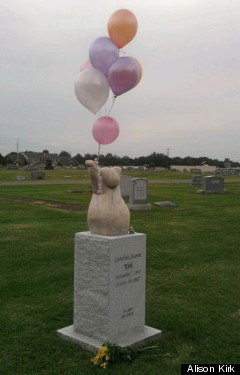
For her first birthday, Caroline's aunt gave her a dancing figurine made of glass. Her parents commissioned a whimsical, bigger version of it to rest on Caroline's gravestone in Mount Hope Cemetery, about 20 miles south of Nashville.
"I did look into if we could bury Caroline at our own house. We could have," says Alison. "But it's not like we are on some ancestral ground that has been passed for generations." She opted for a cemetery. Mount Hope, about 20 miles south of Nashville in Franklin, fit her needs. It's small, with a "country feel," she says. "No big landscaping, and not this big uniform place."
On Thursday morning, the family carried Caroline back downstairs. They lifted her into a casket that was a simple, pine box. Alison put The Little Engine That Could next to her daughter. Doug put in a small, leather keychain shaped like a vintage ink jar that he had used since college ("It was a continuity of presence," he says. "I pretty much had it on me or nearby for 26 years ... It was irreplaceable even though it meant nothing to anyone else but me").
He rode in the hearse with his daughter, and before the body was lowered into the ground, the hospice chaplain read "The Circle of Days," an adaptation of a prayer by Saint Francis of Assisi that honors God's creation of the elements, animals and the heavens. Doug sang Caroline's favorite song, one that would always soothe her in times of pain: "Big Rock Candy Mountain." It tells the story of a hobo's idea of paradise.
Afterwards, there was a memorial service at Vanderbilt University, where both parents first met. Religion in any formal sense was absent.
"We wanted a simple funeral because her life was simple," says Alison. "It was short and simple."
She also considers it one of the best decisions she has ever made.
*** It's not always as easy as the Kirks found it to be.
Richard Bentley, a 70-year-old retiree who lives in Tupper Lake in upstate New York, has tried twice to take care of his loved ones when they died. His dad died in 2008 of multiple myeloma, a cancer of the plasma cells, and, 13 years before that, his mother died of an aortic dissection.
New York is one of the few states that requires a funeral director to be present or to sign off on nearly every part of after-death care. Medical examiners and coroners have to turn over bodies to funeral directors, and the law says an undertaker has to personally oversee each funeral. (The other states with similarly restrictive laws are Connecticut, Illinois, Indiana, Louisiana, Michigan, Nebraska and New Jersey).
For his father, Bentley says the process was unnecessarily intrusive. He wanted a cremation, which would usually require a death certificate, transport of the body and a cremation fee in most states, but he had to meet with his hospice nurse, the town clerk and the local funeral director to arrange all the paperwork necessary. The total cost: $940. He reluctantly obliged.
"One doesn?t wish to think about things like cost and comparison shopping at the time of a loved one?s death," says Bentley. "At the same time, I do not believe, and my father before his passing did not believe, that some stranger should be entitled to walk off with a week?s wages or more in return for a few hours of work at the expense of the loved one?s spouse and children."
Because his mother was airlifted to a hospital in Vermont to have her heart condition treated, Bentley says he had a much easier time with her. She died in the hospital, where he had a family viewing in the chapel, and he was able to take her body -- stored in a box -- from the morgue to his car. He drove her to a crematorium near the Vermont-New Hampshire border (it would have been illegal to transport the body to New York state), where it was cremated over the next few days. Her boxed ashes later arrived via mail to his house, where he held her memorial.
"We would like to see New York state change its funeral law to allow family to handle such matters as filing death certificates, home viewing and preliminary care of the deceased, and transportation of the deceased without the intervention of a licensed funeral director as prescribed by current law," says Bentley, who's on the board of the Memorial Society of the Hudson-Mohawk Region, a group that monitors New York funeral laws and counsels families interested in home funerals. "There is no public need that is satisfied by such laws."
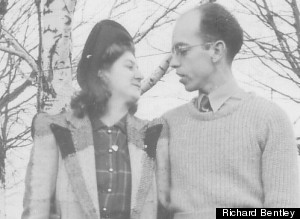
Richard Bentley organized home funerals for both of his parents, pictured above during their honeymoon in November 1941. Rachel Mary Bentley died on November 9, 1995 at 77. Paul Bentley died on November 16, 2008 at 91.
The public need for funeral homes -- there are 19,680 in the U.S. today -- is relatively new.
Until the Civil War, death was largely a home matter and home funerals were the norm. It was common at the time for unembalmed bodies to be put in simple caskets and buried in cemeteries that weren?t treated with pesticides. (It?s a growing trend today, known as ?green burial.?) Historians say that our culture?s approach to death in the pre-Civil War years had much to be praised.
"Death was much more ingrained into daily life and cultural life. People were rural-living, mortality rates were higher. Most people died at home," says Gary Laderman, a professor of religious studies at Emory University and author of Rest in Peace: A Cultural History of Death and the Funeral Home in Twentieth-Century America. It was a time before modern hospitals, "a kind of mediator between the living and the dying," he says.
But the war and the need to transport bodies from the South to the North led to widespread embalming. The practice was even more popularized after Abraham Lincoln's embalmed body was taken on a 13-city tour after his assassination in 1865. Mourners gawked at how well it was preserved, according to Laderman.
"The most common thing used to be hands-on family involvement. We Americans have completely forgotten that there is nothing universal about calling the mortuary at 3 in the morning," says Josh Slocum, executive director of the Funeral Consumers Alliance and co-author of Final Rights: Reclaiming the American Way of Death.
Slocum thinks there are two reasons that home funerals haven't taken off: "people not knowing they have the option and the ways laws in many places are written to favor the funeral home industry."
It's nearly impossible to do a home funeral in some places, but the funeral homes and home funerals can often coordinate activities to get around that hurdle. Like the Kirks in Nashville who hired a funeral director to guide them on how to take care of Caroline's body and used the funeral home's hearse, there's been an uptick in families who want to use only select services of a funeral home. Just as hospice care for the dying gradually became mainstream over the decades, newer generations of less traditional funeral directors are more likely to be interested in helping make arrangements for home services, according to the National Funeral Directors Association.
"I don't think there is a funeral director who is opposed to a family being more intimately involved as long as it better meets the needs of a family, but this is an evolving process," says Pat Patton, the co-owner of Patton-Schad Funeral & Cremation Services in Sauk Center, Minn., and a board member of the NFDA. In his 34 years in the business, he's been asked to help arrange one home funeral. "If you don't want what we usually provide, how do we know what you do want? How do we make it work for both of us? Funeral directors are certainly willing to help families take care of their dead at home, but because it's new and different and outside what would be normal for our business, it takes time."
He also isn't sure home funerals are always the right choice.
"In general, deaths at home and a person caring for everything is fine. But we know that, depending on the cause of death, things can go badly in a hurry," says Patton. "Sometimes there can be rapid decomposition, blistering on the skins or fluids leaking from the body, things that a family may not be able to deal with. Our concern related to home funerals is that people may just not be ready."
In a culture where talk of death is avoided, direct experiences like home funerals have benefits and drawbacks. On one hand, seeing and sitting with a dead loved one can help a mourner accept death, says Sue Wintz, who is a consultant and managing editor at New York-based HealthCare Chaplaincy. "That action is part of the healing," says Wintz, who was a hospital and hospice chaplain for 30 years.
But Wintz says that home funerals require "a lot of support and help from your community or family. You can get mentally and physically exhausted."
*** Alison admits that Caroline's funeral was tiring.
Growing up as the youngest sibling in a big Southern Baptist family in Louisiana, she had seen lots of death and had been to plenty of traditional funerals. But even though they were physically easier than services for her daughter, she found them to be emotionally incomplete events (especially so when her parents died).
"My father died from bladder cancer when I was 16. And I just didn't know what I needed at the time to grieve for him,? she says. ?And when my mother died -- the same year I was pregnant with Caroline -- it was just this huge social event."
Her mother?s funeral was held back home in Shreveport at a large church designed to seat a few thousand, with a reception before, a reception after, and lots of talking among hundreds of guests in between.
"There were so many family friends I hadn't seen in years. People just kept on coming to say, 'Hi,' and, 'You've got to see this cousin and that cousin.' I just wanted to be in the sanctuary with my mom with her open casket," she remembers. "I wanted to have a little last time to be in her presence. I wanted to talk to her."
Alison was alone with her mother only for a few minutes. "I was self-conscious because people kept on coming in. But I got to touch her hand briefly. She was very cold. And it was a reminder that it was only her body."
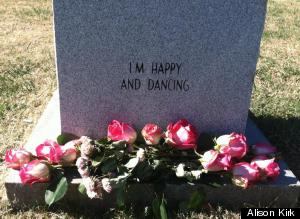
When her parents asked her how she was doing, Caroline would often enthusiastically respond by saying "I'm happy and dancing." The phrase is engraved on her memorial stone.
So when Caroline died, Alison spoke to her every day, sometimes every hour.
She wrote entries in an online journal to remember how Caroline?s death felt and to explain her decision to family and friends: "I told Caroline that if she knew what a froufrou outfit I had her in she?d be giving me the business. We compromised in that I let her stay barefoot under her big skirt. The girl never liked shoes ... There were a few changes in Caroline?s body over the next two days, not many, and they served to remind us that this was only her body, that her spirit had been released. Everyone had time to sit with her, read to her ... I frequently found myself running into her room to tell her what I was doing, and it felt so natural."
Before Caroline left the house, the parents took her sister, Kate, into the room where she was held. "We're saying bye to Caroline's body," they told her. "But she will always be your sister and she will always love you."
Kate was 5, and she, too, was already showing signs of Niemann-Pick disease.
Kate is now 11 and in a wheelchair. She was pulled out of fourth grade a few months ago, and has been under home hospice care. She can breathe on her own, but is fed through a tube and has frequent seizures. She's awake for only a few hours each day.
Her condition isn't as complicated as Caroline's. Her decline is almost entirely neurological, and her death will be akin to that of someone dying of Alzheimer's. She could live for a few years or she could have a sudden seizure that would end her life.
The Kirks have purchased a plot next to Caroline's grave for Kate, but have otherwise made few concrete plans for her death. They don't know what she will wear or how she will look. It's not time to plan for that. She's still alive. They do know that she'll die at home in the hands of her parents, hearing the same "I love yous" her sister last heard. There will be no funeral home taking her covered body away, and no wake in a room she's never seen.
"It's a hard thing to have to say the final goodbye to your child," says Alison. "But with Caroline, we made it as good as it could be. I wouldn't change a thing when Kate's time comes."
Catholic Prayer For The Dead
Eternal rest, grant unto him (her) O Lord and let perpetual light shine upon him (her). May he (she) rest in peace (Amen) May their souls and the souls of all the faithful departed, through the mercy of God, rest in peace. Amen.
Jewish Prayer For The Dead - Mourners Kaddish
Exalted and hallowed be His great Name. (Cong: "Amen.") Throughout the world which He has created according to His Will. May He establish His kingship, bring forth His redemption and hasten the coming of His Moshiach. (Cong: "Amen.") In your lifetime and in your days and in the lifetime of the entire House of Israel, speedily and soon, and say, Amen. (Cong: "Amen. May His great Name be blessed forever and to all eternity, blessed.") May His great Name be blessed forever and to all eternity. Blessed and praised, glorified, exalted and extolled, honored, adored and lauded be the Name of the Holy One, blessed be He. (Cong: "Amen.") Beyond all the blessings, hymns, praises and consolations that are uttered in the world; and say, Amen. (Cong: "Amen.") May there be abundant peace from heaven, and a good life for us and for all Israel; and say, Amen. (Cong: "Amen.") He Who makes peace in His heavens, may He make peace for us and for all Israel; and say, Amen. (Cong: "Amen.")
Bahai Prayer For The Dead
O my God! This is Thy servant and the son of Thy servant who hath believed in Thee and in Thy signs, and set his face towards Thee, wholly detached from all except Thee. Thou art, verily, of those who show mercy the most merciful. Deal with him, O Thou Who forgivest the sins of men and concealest their faults, as beseemeth the heaven of Thy bounty and the ocean of Thy grace. Grant him admission within the precincts of Thy transcendent mercy that was before the foundation of earth and heaven. There is no God but Thee, the Ever-Forgiving, the Most Generous.
Muslim Prayer Al-Fatiha
"In the name of God, the Entirely Merciful, the Especially Merciful. All praise and thanks is for to God, [The] Creator, Owner, Sustainer of the Worlds. The Entirely Merciful, The Especially Merciful. Owner of the Day of Recompense. You alone do we worship and You alone we seek for help. Guide us to the Straight Path. The path of those whom Your blessings are upon, Not of those who You have cursed nor of those who have gone astray."
Hindu Prayer For The Dead
The wise have said that Atman is immortal: And that the phenomenon of death is merely the separation of the astral body from the physical body. The five elements of which the body is composed return to their source. Our scriptures teach us that as pilgrims unite and separate at a public inn, so also fathers, mothers, sons, brothers, wives, relations unite and separate in this world. He who thus understands the nature of the body and all human relationships based upon it will derive strength to bear the loss of our dear ones. In Divine plan, one day each union must end with separation.
Anglican Prayer For the Dead
O God, whose mercies cannot be numbered: Accept our prayers on behalf of thy servant N., and grant him an entrance into the land of light and joy, in the fellowship of thy saints; through Jesus Christ thy Son our Lord, who liveth and reigneth with thee and the Holy Spirit, on God, now and for ever. Amen.
Words For Parting
He is made one with Nature; there is heard His voice in all her music, from the moan Of thunder, to the song of night's sweet bird; He is a presence to be felt and known In darkness and in light, from herb and stone... He is a portion of the loveliness Which once he made more lovely. Words for Parting: 2 The courage of the early morning's dawning, And the strength of the eternal hill, And the peace of the evening's ending, And the love of God, be in our hearts. Words for Parting: 3 Farewell! The world is better for your having lived, We are better for having known you. We loved you living- we love you now. Farewell! Words for Parting: 4 Farewell, traveler. We do not know your destination but our love and gratitude go with you. Rest now- in peace- and in the love we bear you.
Earlier on HuffPost:
"; var coords = [-5, -72]; // display fb-bubble FloatingPrompt.embed(this, html, undefined, 'top', {fp_intersects:1, timeout_remove:2000,ignore_arrow: true, width:236, add_xy:coords, class_name: 'clear-overlay'}); });
Source: http://www.huffingtonpost.com/2013/01/25/home-funerals-death-mortician_n_2534934.html
instagram mark sanchez christina aguilera Mayan End Of The World Olivia Black the voice World Ending 2012







